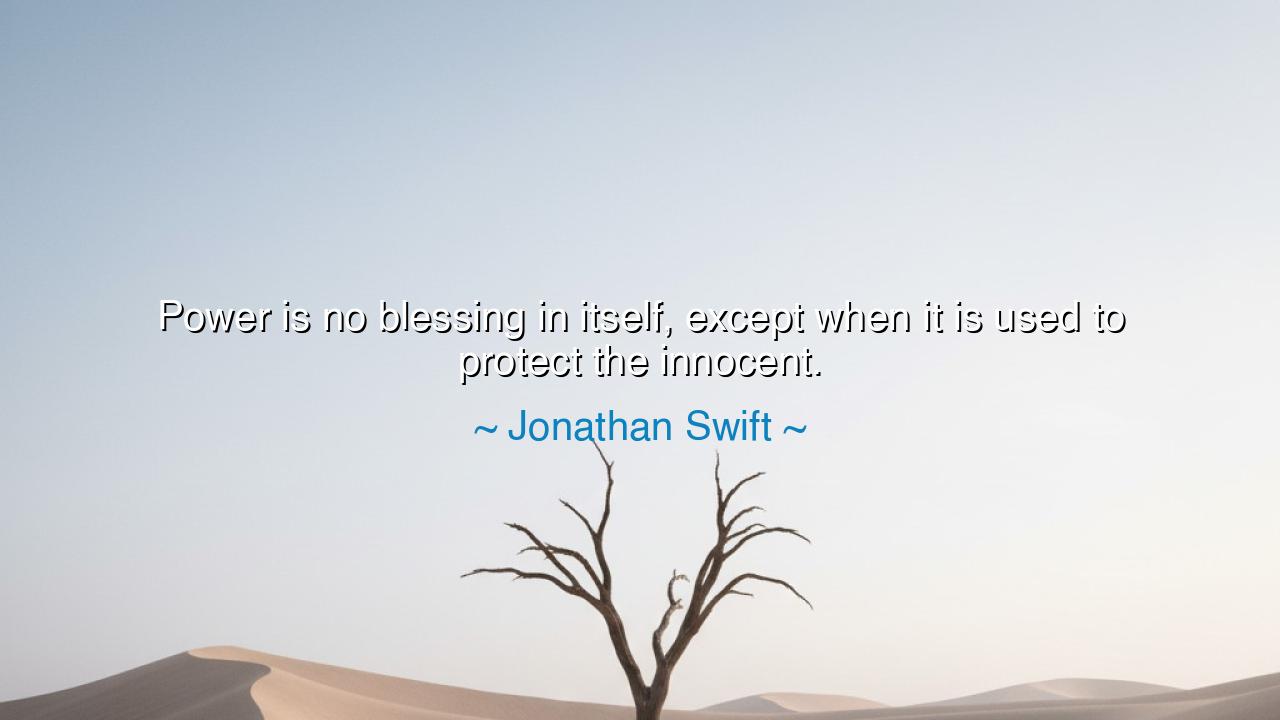
Power is no blessing in itself, except when it is used to






The great satirist and thinker Jonathan Swift, whose words pierced the pride of kings and the folly of men, once declared: “Power is no blessing in itself, except when it is used to protect the innocent.” These words shine like a torch amidst the darkness of history, for they remind us that power, though mighty, is not inherently good. Like fire, it can bring warmth and light when guided by virtue, or destruction and ruin when wielded by greed and cruelty. Its value lies not in its mere possession, but in how it is used.
Many are tempted by power, seeing it as the highest prize a mortal can attain. Kings build empires, generals wage wars, rulers shape nations—all in the name of glory. Yet, Swift reveals a profound truth: power becomes a curse when it serves only ambition. It is a blessing only when it shields those who cannot shield themselves—the weak, the oppressed, the innocent. Without this sacred purpose, power corrupts the soul of its bearer and leaves a trail of suffering in its wake.
History gives us a shining example in the life of Abraham Lincoln. When the United States was torn apart by civil war, Lincoln held immense authority. He could have used his power to punish his enemies or to secure his own legacy. Instead, he chose to wield it in defense of the innocent—the millions enslaved, voiceless and powerless. Through his leadership, the chains of bondage were broken, and his name became a symbol of justice. His story shows how power, when aligned with compassion, can become a true blessing to the world.
In contrast, the tragic reign of Adolf Hitler reveals the opposite. His rise to power was marked not by the defense of the innocent, but by their persecution. Under his rule, countless lives were destroyed, and the world was plunged into chaos. Here, power was stripped of all virtue, becoming a weapon of tyranny. Swift’s words echo like thunder in the face of such darkness: without a moral foundation, power is nothing but a curse upon mankind.
Let this teaching be inscribed upon the hearts of rulers and citizens alike: seek not power for its own sake. If you are granted authority, let it serve as a shield, not a sword. Protect the defenseless, uplift the downtrodden, and act as a guardian of justice. For in doing so, power is transformed from a dangerous burden into a divine gift. As Swift teaches, it is only through service to the innocent that power fulfills its highest and holiest purpose.






KTKhiem Tran
I wonder, what does it mean to protect the innocent in this context? Does it mean providing safety, or does it also extend to social and economic justice? In the real world, power dynamics are so complex, and sometimes those who claim to protect the innocent are actually creating systems that harm them. Could this quote be an ideal we should strive for, or is it an impractical vision in today’s world?
CLle cao linh
This quote brings up an interesting point, especially when thinking about modern politics. It feels like many leaders claim to act in the interest of the people but often fail to protect the most vulnerable. Could it be that the idea of ‘protecting the innocent’ has been redefined to benefit certain groups over others? How do we hold leaders accountable to a broader, more inclusive interpretation of this responsibility?
MHTran Thi My Hanh
I’ve always felt that power can corrupt, which makes me question the quote. Is it really possible to use power for good consistently? Or does the nature of power itself lead to abuse over time? Maybe history has shown us that even well-intentioned rulers can fall into patterns of oppression. So, how can we ensure that power remains a tool for good, rather than something that perpetuates harm?
NDNhan Dang
While I agree with the sentiment, it’s hard to ignore that not everyone with power chooses to protect the innocent. I often wonder if people in positions of power are ever fully aware of their responsibility to protect the vulnerable. Can someone truly have power without understanding its implications? And if they don’t understand it, should they even hold that power? Maybe this is where education and empathy should come into play.
NHNguyen Helena
I feel like this quote emphasizes a fundamental truth about leadership. Power, in itself, is neither good nor bad; it's what you do with it that counts. However, how can we truly ensure that power is used for good? What mechanisms or systems can be put in place to hold leaders accountable for their use of power? It seems like a lot of power structures are built to protect the powerful rather than the vulnerable. How do we change that dynamic?